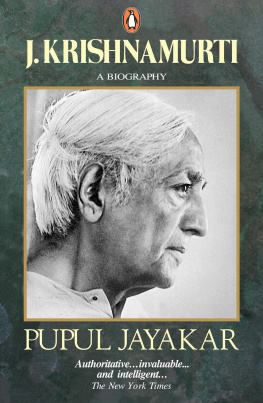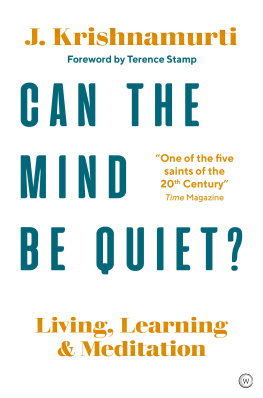Pupul Jayakar - Fire in the Mind: Dialogues with J. Krishnamurti
Here you can read online Pupul Jayakar - Fire in the Mind: Dialogues with J. Krishnamurti full text of the book (entire story) in english for free. Download pdf and epub, get meaning, cover and reviews about this ebook. publisher: Penguin, genre: Religion. Description of the work, (preface) as well as reviews are available. Best literature library LitArk.com created for fans of good reading and offers a wide selection of genres:
Romance novel
Science fiction
Adventure
Detective
Science
History
Home and family
Prose
Art
Politics
Computer
Non-fiction
Religion
Business
Children
Humor
Choose a favorite category and find really read worthwhile books. Enjoy immersion in the world of imagination, feel the emotions of the characters or learn something new for yourself, make an fascinating discovery.

- Book:Fire in the Mind: Dialogues with J. Krishnamurti
- Author:
- Publisher:Penguin
- Genre:
- Rating:5 / 5
- Favourites:Add to favourites
- Your mark:
- 100
- 1
- 2
- 3
- 4
- 5
Fire in the Mind: Dialogues with J. Krishnamurti: summary, description and annotation
We offer to read an annotation, description, summary or preface (depends on what the author of the book "Fire in the Mind: Dialogues with J. Krishnamurti" wrote himself). If you haven't found the necessary information about the book — write in the comments, we will try to find it.
Fire in the Mind: Dialogues with J. Krishnamurti — read online for free the complete book (whole text) full work
Below is the text of the book, divided by pages. System saving the place of the last page read, allows you to conveniently read the book "Fire in the Mind: Dialogues with J. Krishnamurti" online for free, without having to search again every time where you left off. Put a bookmark, and you can go to the page where you finished reading at any time.
Font size:
Interval:
Bookmark:
Fire in the Mind: Dialogues with J. Krishnamurti
Copyright 1995 Krishnamurti Foundation Trust Ltd.
F IRE IN THE M IND
DIALOGUES WITH J. KRISHNAMURTI
Pupul Jayakar
Contents
Foreword
Sceptical research, sceptical investigation is the true spiritual process. This is true religion.
Madras, 14 January 1981
This collection of J. Krishnamurtis dialogues is my homage to a profoundly religious revolutionary, affirming a teaching of compassion and freedom.
KrishnamurtiKrishnaji to his friendsnegated all spiritual authority. He sought a holistic perception and a freedom of the mind from reactive responses. He regarded all beliefs and ideals as crippling illusions which distorted mans relationship with nature and humanity and generated conflicts at all levels of life.
Krishnajis approach to the discovery of truth is as relevant today as it will be in centuries to come.
*
It was in October 1947, two months after Independence, that Krishnaji returned to India from Ojai, California, after an absence of over nine years. A new India awaited him. The partition had left a trail of massacres and hatred that had traumatized the nations psyche.
Krishnaji was staying in Bombay and, unlike on his previous visits to India, he made himself available mornings and evenings. Seekers came to sit around him and question him on problems they felt were crucial to an understanding of their own lives and to the countrys new awakening. Most of them were young peoplefreedom fighters disillusioned in the aftermath of freedom, confused and in despair at the ambitions, hunger for power, sycophancy and double talk that had surfaced soon after Independence. Many creative people came to him: poets, painters, monks and sannyasiseager to probe, eager to discuss the true and the creative. There were also those burdened with sorrow who came to the sage to be healed.
The majestic presence of Krishnaji and the myths and legends that surrounded his early life overwhelmed many of us, young and old. With great simplicity and denying all hierarchy, Krishnaji spoke to us directly. He brought us into the perceptive field of his concerns, making it possible for us to ask questions and reveal our sorrows, our fears and our hopes.
It was during these months in Bombay that dialogue emerged as a way of exploration into consciousness. It was an approach that was to become central to Krishnajis teaching.
There is an ancient tradition of religious discourse in India which stresses dialogue and doubt as crucial to the discovery of truth. But Krishnaji negated the hierarchy inherent in a dialogue between guru and disciple. There were no anchors. No guru, no book, no tradition could give answers to lifes questions, nor free the human mind from bondage. The seeker, the questioner, the human being in sorrow had to accept total responsibility.
At first we who listened found it difficult to follow what lay behind his words. There were a few who were aware that there was a within that could be discovered or explored. With immense patience Krishnaji repeatedly stressed the need to slow down the mind, to pause, to ponder, to question relentlessly, to observe thought without judgement and to perceive thought as what is.
We had been nurtured on an educational tradition which stressed reason and the perception of the outer world as the actual and we saw the religious mind as based on belief and faith. At first we found it impossible to listen and perceive what lay within us. There was, however, a yearning to seek that which lay hidden at the root of the human mind.
Spontaneously a form was taking shape. Krishnaji sat with us in a circle, listening with great intensity to the questions asked by the participants. There was never an immediate answer, he paused, posed a counter-question, threw the question back to the questioner. He found that in this situation he could directly contact the minds of his companions, draw them close and understand the nature of the obstacles they faced in perceiving thought without distortion. He was aware when questions were asked from direct perception or, when in the process of listening a counter-question born of memory was taking shape as thought in the brain, then consciousness was fragmented, then there was no deep listening.
It was essential to listen with intensity to Krishnaji, to listen critically, even to challenge him. For it was only when challenged that Krishnajis responses held the light of vast insights. And yet if our minds failed to understand, with grace, with ease, without effort, Krishnaji would say: Let us begin again. That is patience. That patience has no time. Impatience has time.
The approach of Krishnaji was entirely new, demanding from us the energy to listen, to perceive, to question and be questioned. For Krishnamurti too it was a challenge. It is possible that new insights were arising as he investigated. He was eager to awaken in us an intelligence that had not crystalized, that was not conditioned by words. It was with such a mind that we could journey with him into the depths of consciousness. In the very act of listening without effort, miracles happen, light penetrates darkness.
Sensing our confusion and aware of our inability to listen, he asked: What is self-knowing? How do you know yourself? Is it in the observing of a thought springing up? We are reluctant to let go the first thought and so there is a conflict. Or is self-knowing to extinguish the first thought and perceive the second thought and then the third, then dropping the third and following the fourth, so that there is a constant alertness and awareness of the movement of thought and an energy that comes alive born of attention?
Unfortunately there are hardly any records of those early dialogues except for the few notes kept by some of us gathered around him.
Throughout the 1950severy year, in factKrishnaji travelled to India and the West. He returned from the West in the early 1960s afire with the ferment in the scientific and technological world and the volcanic energy being released that would inevitably transform human consciousness and generate explosive pressures on humankind. With the eye of prophesy, he looked into the centuries that lay ahead and perceived the velocity of change that was to come about with the unlocking of the mysteries of nature and the birth of skills that could manipulate and structure what was discovered. He had intimations of a massive search for artificial intelligence that would render certain human faculties obsolete.
The dialogues had assumed a new weight and density; a subtlety of enquiry was transforming perceptive processes. Every cell in Krishnajis brain seemed to be awake. Aware of every movement, every sound, in the outer and the inner, he was penetrating in depth into the nature of the scientific mind and the religious mindthe only two minds that could survive in the centuries ahead.
Something new is going on, of which we are not aware, he said. We are not aware of the significance, the flow, the dynamic quality of the change. There is no time.
The scientific mind with its logic, its precision, its enquiry, investigates the outer world of nature, but this does not lead to an inward comprehension of things; but an inward comprehension brings about an understanding of the outer. We are the result of the influences of the outer. The scientific mind is precise and clear in its investigation. It is not a compassionate mind, for it has not understood itself.
Bombay, 8 March 1961
The religious mind is capable of thinking precisely, not in terms of the negative and positive; therefore, that mind can hold within it the scientific mind. But the scientific mind does not contain the religious mind because it is based on time, knowledge; it is rooted in success and achievement. The religious mind is the real revolutionary mind. It is not a reaction to what has been. The religious mind is the only mind that can respond totally to the present challenge and to all challenges, at all times.
Next pageFont size:
Interval:
Bookmark:
Similar books «Fire in the Mind: Dialogues with J. Krishnamurti»
Look at similar books to Fire in the Mind: Dialogues with J. Krishnamurti. We have selected literature similar in name and meaning in the hope of providing readers with more options to find new, interesting, not yet read works.
Discussion, reviews of the book Fire in the Mind: Dialogues with J. Krishnamurti and just readers' own opinions. Leave your comments, write what you think about the work, its meaning or the main characters. Specify what exactly you liked and what you didn't like, and why you think so.


